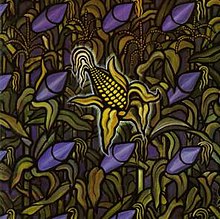
Bad Religion is an American punk rock band, formed in Los Angeles, California, in 1980. The band's lyrics cover topics related to religion, politics, society, the media and science. Musically, they are noted for their melodic sensibilities and extensive use of three-part vocal harmonies. The band has experienced multiple line-up changes, with singer Greg Graffin being the band's only constant member, though fellow founding members Jay Bentley and Brett Gurewitz have also been with the band for most of their history while guitarist Brian Baker has been a member of the group since 1994. Guitarist Mike Dimkich and drummer Jamie Miller have been members of the band since 2013 and 2015 respectively. To date, Bad Religion has released seventeen studio albums, two live albums, three compilation albums, three EPs, and two live DVDs. They are considered to be one of the best-selling punk rock acts of all time, having sold over five million albums worldwide.

Generator is the sixth studio album by the punk rock band Bad Religion. Although the album was completed in the spring of 1991, it was not released until 1992; the band was not happy with the artwork and packaging, and went through several ideas that were eventually scrapped. Generator was the band's first release with drummer Bobby Schayer, who replaced Pete Finestone during the Against the Grain tour.

Suffer is the third studio album by American punk rock band Bad Religion, released on the Californian independent record label Epitaph Records on September 8, 1988. It was the first album that was both released and distributed by the label. Following the release of the EP Back to the Known (1985), Bad Religion went on a temporary hiatus, then reunited with its original members and went to work on their first full-length studio album in five years.
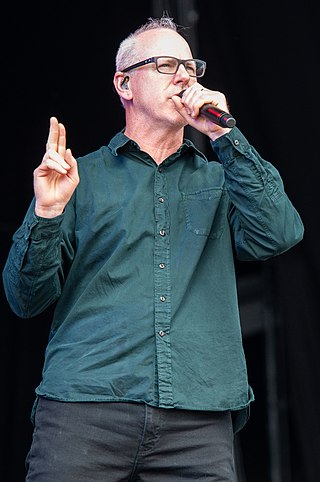
Gregory Walter Graffin is an American singer and evolutionary biologist. He is most recognized as the lead vocalist and only constant member of punk rock band Bad Religion, which he co-founded in 1980. He embarked on a solo career in 1997, when he released the album American Lesion. His follow-up album, Cold as the Clay, was released nine years later. His newest solo work is Millport, released in 2017.
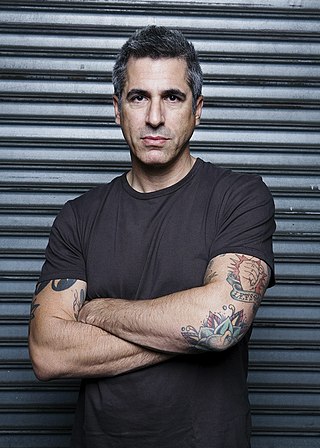
Brett W. Gurewitz, nicknamed Mr. Brett, is an American musician and record producer best known as the co-founder and guitarist of the punk rock band Bad Religion. He is also the owner of the music label Epitaph Records and a number of sister labels. He has produced albums for Bad Religion as well as Epitaph Records labelmates NOFX, Rancid, and Pennywise, among others. Gurewitz also had a project called Error, which also featured Atticus Ross, Leopold Ross, and Greg Puciato. He is also the co-founder of comic book and graphic novel publisher, Black Mask Studios.

Stranger Than Fiction is the eighth full-length studio album and major label debut by American punk rock band Bad Religion, released in 1994. It was a major breakthrough for Bad Religion, being certified Gold by the Recording Industry Association of America and becoming the band's first album to chart on the Billboard 200, peaking at 87.

The New America is the eleventh studio album by punk band Bad Religion. It was released in 2000 and is their last album on Atlantic Records.
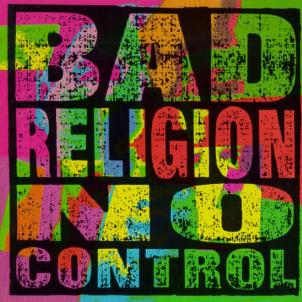
No Control is the fourth studio album by American punk rock band Bad Religion, released on November 2, 1989, through Epitaph Records. Bad Religion began work on the album while touring in support of their previous album, Suffer (1988). No Control is stylistically faster than its predecessor, owing more to hardcore punk. Additionally, it was the first Bad Religion album not to feature a lineup change from the previous album.

Recipe for Hate is the seventh studio album by American punk rock band Bad Religion, released on June 4, 1993. It was their last album on Epitaph Records for nine years and the band had switched to Atlantic Records, who re-released the album several months after its release.
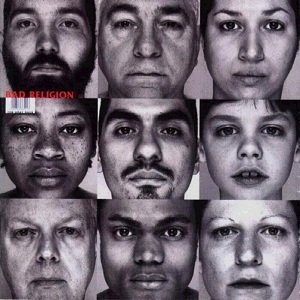
The Gray Race is the ninth full-length album of the punk rock band Bad Religion, which was released in 1996. It was the follow-up to the band's highly successful 1994 album Stranger Than Fiction.

No Substance is the tenth full-length album by the punk rock band Bad Religion. It was the band's third release on Atlantic Records, and their second studio album since guitarist Brett Gurewitz's departure.
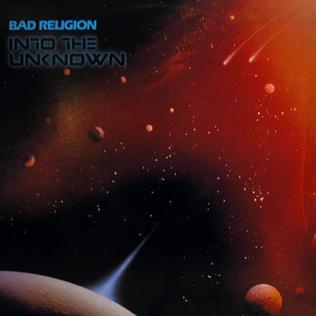
Into the Unknown is the second studio album by Bad Religion, released in August 1983 through Epitaph Records. The album marks a distinct departure from the band's previous album; instead of featuring hardcore punk, the album is characterized by slower tempos, use of electronic organ and pianos, and a prog-influenced hard rock sound. Into the Unknown is the only Bad Religion album to feature Paul Dedona on bass and Davy Goldman on drums. Dedona was ejected from the band before their next recording and replaced by Tim Gallegos, while former drummer Pete Finestone returned to the band in 1986. The album also features Bad Religion's longest track to date, "Time and Disregard", which is seven minutes long.

Greg Hetson is an American musician. He is best known as the guitarist for the influential punk rock bands Circle Jerks and Bad Religion. He is known for his high energy stage antics which people have coined the term "The Hetson Leap". Hetson was a founding member of and also plays guitar in another supergroup, Punk Rock Karaoke, and the hardcore punk band G.F.P.

How Could Hell Be Any Worse? is the debut studio album by American punk rock band Bad Religion, released on January 19, 1982 by Epitaph Records. Released almost a year after their self-titled EP, it was financed from the sales of the self titled EP and partly by a $1,000 loan by guitarist Brett Gurewitz's father. Its success surprised the band when it sold 10,000 copies in under a year.

Back to the Known is the second EP released by American punk rock band Bad Religion. The name of the EP is a reference to the band abandoning the progressive rock influences of its previous album, 1983's Into the Unknown, and returning to its punk roots.
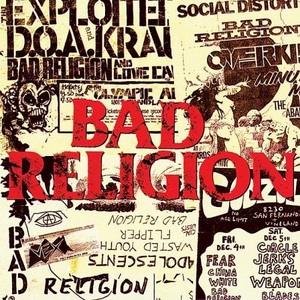
All Ages is a compilation album by the American punk rock band Bad Religion. It was released on July 26, 1995, through Epitaph Records. The compilation contains songs from How Could Hell Be Any Worse? to Generator, and two live tracks recorded during their 1994 European tour, which were the first tracks to feature guitarist Brian Baker.
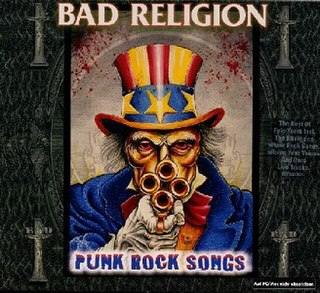
Punk Rock Songs (The Epic Years) is a compilation album by Bad Religion, released in 2002. All songs on this compilation are from their tenure on Atlantic and Epic Records from 1994 to 2000, in addition to four live tracks and both the English and German versions of "Punk Rock Song". Punk Rock Songs was released by Epic without any input from the band members, as Bad Religion had already returned to Epitaph Records, and as of 2017, it has not been released in the United States.

New Maps of Hell is the fourteenth studio album by Bad Religion, released on July 10, 2007.

80–85 is the first compilation album by Bad Religion, released in 1991. It is a collection of their early recordings, predating their third studio album Suffer (1988), excluding their controversial 1983 album Into the Unknown.
